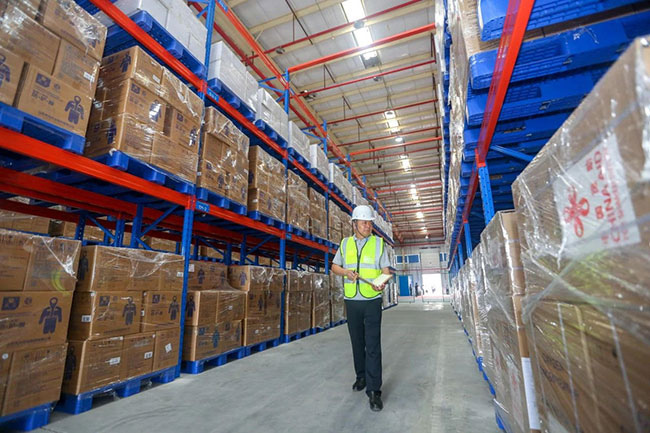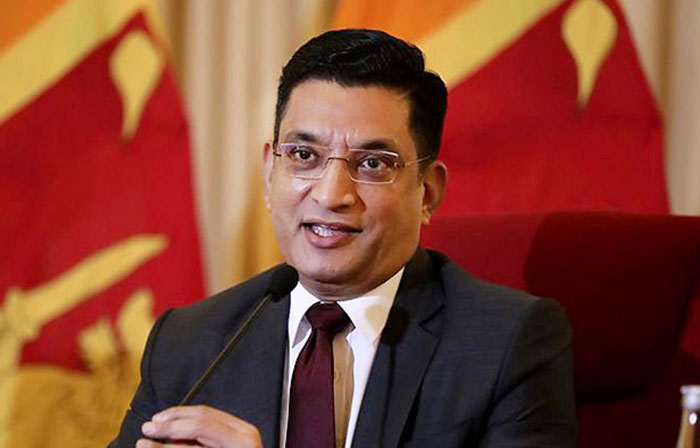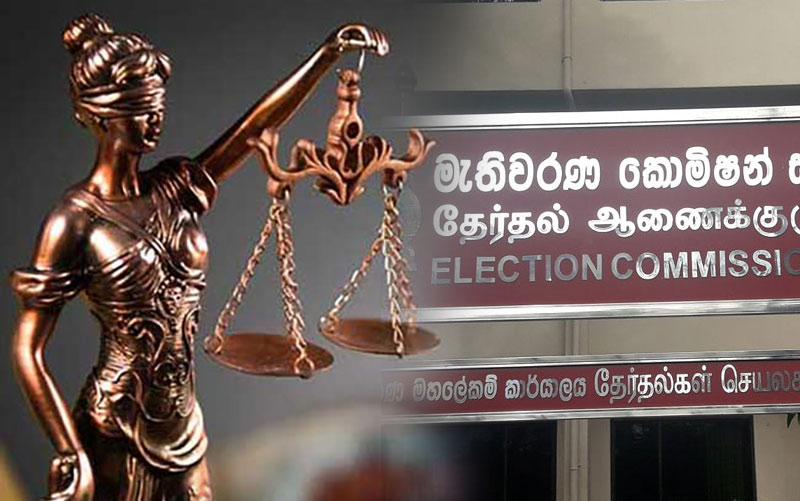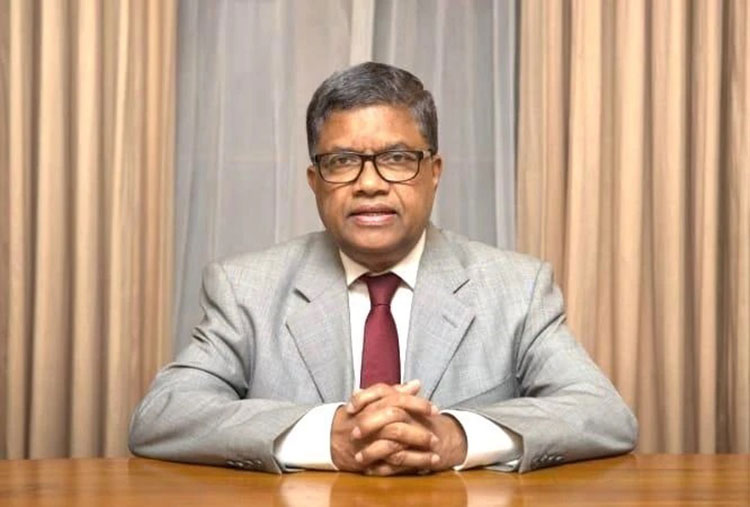News
Chinese Ambassador urges sincere unity and cooperation among regional nations given gravity of pandemic

Given the gravity of the COVID-19 pandemic, countries in the region must cooperate with each other sincerely, Qi Zhenhong, Chinese Ambassador to Sri Lanka said yesterday issuing a statement. With this aim in mind China works with Sri Lanka, Afghanistan, Pakistan, Nepal and Bangladesh to provide pandemic support, he said.
“As of early September, China has provided a total of about 120 million doses of vaccines to South Asian countries through various channels. Among them, Pakistan, Sri Lanka, Bangladesh, and Nepal have received 70 million, 22 million, 19 million, and 7.4 million doses respectively, and Pakistan and Bangladesh also have started local vaccine production with China’s support,” Zhenhong said.
Given below is the statement in full: “Since April this year, South Asia is facing a new round of COVID-19 pandemic, and Sri Lanka has been suffering the most serious impact than ever. In times of adversity, it is even more necessary for people in the same boat to help each other, and more urgently for countries in the region to cooperate sincerely. On April 27th, China established a response mechanism with Sri Lanka, Afghanistan, Pakistan, Nepal and Bangladesh the first time. The foreign ministers of the six countries held a visual conference to discuss joint efforts to fight the pandemic and revive the economy, and achieved important outcomes, including the announcement to establish the China-South Asia Emergency Supplies Reserve and the China-South Asia Poverty Alleviation and Cooperative Development Center. In early July, these two important platforms were officially launched in Chongqing and Chengdu of China, and achieved great outcomes quickly. During the past two months, numerous vaccines and medical supplies have been unhinderedly sent to South Asian countries including, which have strongly supported the fight against pandemic in the region. In this process, we further realize that: Firstly, unity and cooperation is the only correct choice to overcome the pandemic. While facing great pressure on its own pandemic prevention and control, China established and launched the China-South Asia Emergency Supplies Reserve in just 70 days, only was to provide a new and important platform as well as the firmest and strongest support for regional countries to join hands in the fight against the pandemic and emergency cooperation as soon as possible. This fully demonstrates “China’s speed” and “China’s sincerity” in further promoting cooperation with South Asian countries. As President Xi Jinping pointed out, “The Covid-19 pandemic warned the world in a special form that human beings are a community of shared future, honor and disgrace. No country can be immune to major crises, and unity and cooperation are the correct way for the world.”
“Secondly, vaccine cooperation is a key weapon to defeat COVID-19. The six foreign ministers have repeatedly emphasized the key role of vaccines in the fight against the pandemic. President Gotabaya Rajapaksa also stressed that only vaccines could stop the pandemic. As of early September, China has provided a total of about 120 million doses of vaccines to South Asian countries through various channels. Among them, Pakistan, Sri Lanka, Bangladesh, and Nepal have received 70 million, 22 million, 19 million, and 7.4 million doses respectively, and Pakistan and Bangladesh also have started local vaccine production with China’s support. On September 9th, President Xi Jinping announced at the BRICS Summit that on top of the 100 million U.S. dollars donation to COVAX, China will donate an additional 100 million doses of vaccines to fellow developing countries within this year. As a friendly neighbor of China, South Asia will undoubtedly benefit a lot.
“Thirdly, focusing on livelihood is a matter of urgent priority. In order to address the prominent challenges facing South Asian countries in the field of poverty reduction and development in the COVID-19 pandemic, China initiated the China-South Asian Countries Poverty Alleviation and Cooperative Development Center. The successful launching and operation of the center will play an effective role in gathering strength, pooling resources and promoting experience exchanges, thereby supporting the South Asian countries to improve economy and livelihood. It will promote poverty reduction and eradication, as well as enhance the well-being of the people of the region. The Foreign Ministers have also agreed to deepen Belt and Road cooperation, secure the industrial and supply chains, and strengthen collaboration in poverty reduction, food security and other fields. We will continue to actively put the above-mentioned outcomes into effect, while further enhancing the quality of the cooperation mechanism among us, to expand the areas of cooperation, achieve more visible results and better benefit our people.
“This Six Countries FMs’ Meeting Mechanism, as a new initiative, is open, inclusive, and mutually beneficial in its nature. Therefore, it always welcomes new members from the region. China hopes and believes that countries of the region will work together to develop, safeguard and fully utilize this mechanism. China firmly stands with the people of South Asia and always provides as much assistance as possible within its capacity. In July, President Xi Jinping in his speech at the APEC Informal Economic Leaders’ Retreat promised that China will provide another $3 billion international aid over the next three years to support the COVID-19 response and economic and social recovery in other developing countries. As long as the COVID-19 pandemic is haunting the world, China will not halt its efforts and assistance for global cooperation in defeating the pandemic.
“We are delighted to see that under the strong leadership of President Gotabaya Rajapaksa and Prime Minister Mahinda Rajapaksa, and with the joint efforts of its people of all ethnic groups, Sri Lanka has made world-renowned achievements in vaccination. We are also expecting the pandemic situation to improve in following days. China-Sri Lanka cooperation, being important part of China-South Asian cooperation, will certainly benefit from the regional cooperation. The Port City Colombo and the Hambantota Port and Industrial Park have attracted high interests from other South Asian countries including a Maldivian company to build yachts in Hambantota Port. More and more regional cooperative projects will be established in the future. China looks forward to joining hands with Sri Lanka and other regional countries in confronting and overcoming challenges, defeating COVID-19 pandemic and achieving greater and better development in this region.”
News
Indo-Lanka MoUs unlikely to be tabled in Parliament any time soon

…of seven SOCs only one constituted so far
Sri Lanka’s controversial MoU on Defence Cooperation with India was unlikely to be taken up any time soon in Parliament in spite of the House Sectoral Oversight Committee (SOC) on Governance, Justice and Civil Protection that has been assigned defence, authoritative sources told The Island.
Of the seven SOCs only one was activated with the recent election of Dr. Najith Indika, MP, as the Chairman of the Sectoral Oversight Committee on Governance, Justice, and Civil Protection of the Tenth Parliament.
The inaugural meeting of the current parliament was held on 21 Nov., 2024.
Sources said that the parliament had met for the last time yesterday (10) before the Sinhala and Tamil New Year holiday. It is scheduled to meet again on May 8.
The UNDP that has financially backed the establishment of the SOC system to help strengthen the role of the parliament recently reached a consensus with the government to reduce the number of SCOCs from 17 to seven. The Island, in writing, asked for the UNDP’s reaction to the operation of SOCs but had not received a response at the time this edition went to press.
The SOCs have the power to examine any Bill, except the Bills defined in Article 152 of the Constitution, Treaty, Reports including the Annual and Performance Reports relating to the institutions coming under its purview or any other matter referred to the Committee by Parliament or any Committee or a Minister relating to the subjects and functions within their jurisdiction.
Sources said that out of the seven SOCs only one had been activated during the past five months though the government and the Opposition agreed to share the leadership of them.
Accordingly, it was agreed that the government would appoint chairpersons to four SOCs –– Economic Development and International Relations, Health, Media and Women’s Empowerment, Science, Technology and Digital Transformation and Governance, Justice and Civil Protection .
It was also agreed that the Opposition would appoint chairpersons to the SOCs on Infrastructure and Strategic Development, Education, Manpower and Human Capital, and Environment, Agriculture and Resource Sustainability to the Opposition.
India and Sri Lanka on April 5 signed six MoUs on HVDC interconnection for import/export of power, cooperation in the field of sharing successful digital solutions implemented at population scale for digital transformation, defence cooperation, multi sectoral grant assistance for Eastern province, health and medicine and pharmacopoeia cooperation. In addition to them, India, Sri Lanka and UAE signed a tripartite MoU cooperation in development of Trincomalee as an energy hub.
The Island asked Ali Sabry, PC, who served as foreign minister during Ranil Wickremesinghe’s tenure as the President (July 2022 to Sept 2024) whether the seven MoUs had been discussed during that period. We also asked him whether those MoUs should have been discussed at SOCs before finalisation.
Sabry said: “Most of the MOU to my knowledge were discussed except the one on Defence Cooperation, which I am unaware of. General procedure is the relevant line ministry prepares the initial draft and gets the input from the Foreign Ministry and goes for stakeholder consultation of all ministries and agencies involved. Then the President’s Office grants its sanction and with the approval of the AG, it goes before the cabinet of ministers. With Cabinet approval, the government could sign the MOU.”
Sabry said that he was of the opinion that once the government signed a particular MoU, it should be placed before the parliament. “MOU’s are generally not legally binding and only signify the desire to work together. If the signed MoUs were to be implemented, then they have to be followed by agreements or laws.”
He emphasised the pivotal importance of transparency in the whole process. The ex-minister said: “I think transparency is crucial in these matters. Concealment leads to speculation and assumption of the worst. The MOUs should be tabled in Parliament for public information. Discussion at the relevant SOCs would have been helpful. There are growing fears fueled by lack of information in the public domain. This is a private comment, not to be attributed to me.
Asked whether MoUs, particularly the ones on defence and energy had to be approved by the Attorney General, the former minister said that the AG has to advise the MoUs compatibility with the Constitution. “But Article 157 of the Constitution does not apply; the 2/3 majority stipulated there envisages only investment treaties.” Foreign Minister Vijitha Herath assured Parliament on April 8 that the AG had cleared all seven MoUs and none of them were inimical to the country.
By Shamindra Ferdinando
News
LG polls: Appeal Court orders EC to accept 35 additional nomination papers

The Court of Appeal yesterday ordered the Election Commission (EC) to accept 35 additional nomination papers for the 2025 local government elections, which had been previously rejected by election officials.
The ruling was issued yesterday by a bench comprising Acting President of the Court of Appeal, Justice Mohamed Lafar Tahir, and Justice Priyantha Fernando. The court ordered the relevant Returning Officers to accept the nominations following hearings on several petitions filed by political parties and independent groups challenging the rejections.
Last week, the Court of Appeal ordered the EC to accept 37 previously rejected nomination papers.
by A.J.A. Abeynayake
News
Defence MoU with Quad member will drag Sri Lanka further into new cold war: CP

The Communist Party (CP) of Sri Lanka yesterday (10) expressed grave concern over the NPP government’s unilateral decision to enter into a defence MOU with Quad-member India.
The CPSL urged All democratic and progressive forces to pressure the government to reveal the contents of the defence agreement with India. It also asked the NPP government to revive the Indian Ocean Peace Zone proposal at the UN and mobilise global opposition to militarisation in the region. All democratic and progressive forces had to build a United Front against a New Cold War, the CP has said.
General Secretary of CP Dr. G. Weerasinghe has issued the following statement: “This decision has been taken without consultation or debate in Parliament and in the context of a New Cold War and heightened militarisation of the Indian Ocean.
During Indian Prime Minister Narendra Modi’s visit to Sri Lanka from 4-6 April, a defence MOU was exchanged between Secretary of the Ministry of Defence of Sri Lanka retired Air Vice Marshal H.S. Sampath Thuyacontha and Indian Foreign Secretary Vikram Misri.
Indian media has framed this MOU as being part of Indian strategy to counter China’s presence in the region.
President Anura Kumara Dissanayake assured Modi that Sri Lanka, “will not permit its territory to be used in any manner inimical to the security of India as well as towards regional stability”. While the CPSL has no fundamental objection to this, questions remain over India’s own commitment to regional stability.
The fact is that India is a member of the Quad and has partaken in US efforts to contain China in a New Cold War. In 2024, current US Secretary of State Marco Rubio tabled a bill in congress to grant India a status on par with NATO members. During a meeting between Modi and US President Donald Trump in February, India and the US entered into a 10-year defence partnership framework to transfer technology, expand co-production of arms, and strengthen military interoperability.
By entering into defence agreements with India, there is a very real danger of Sri Lanka being dragged into the Quad through the back door as a subordinate of India. Sri Lanka could become a de facto part of the Indo-Pacific Strategy and compromise its non-aligned status. This would be antithetical to Sri Lanka’s interests as China is a major investor and trade partner for the country and has supported our sovereignty in international fora.
Sri Lanka is currently not directly embroiled in any conflict with an external actor and therefore has no need to enter into defence agreements. The last defence agreement that Sri Lanka entered into was with the UK-Ceylon Defence Pact (1947-1957), which was a neocolonial arrangement detrimental to Sri Lanka’s sovereignty and international relations.
The defence MOU with India could also be interpreted as a step towards further militarisation of the Indian Ocean, which is a violation of the UN Declaration of the Indian Ocean as a Zone of Peace which both countries supported.”
-

 Business4 days ago
Business4 days agoColombo Coffee wins coveted management awards
-

 Business6 days ago
Business6 days agoDaraz Sri Lanka ushers in the New Year with 4.4 Avurudu Wasi Pro Max – Sri Lanka’s biggest online Avurudu sale
-

 Features5 days ago
Features5 days agoStarlink in the Global South
-

 Business6 days ago
Business6 days agoNew SL Sovereign Bonds win foreign investor confidence
-

 Features2 days ago
Features2 days agoSri Lanka’s Foreign Policy amid Geopolitical Transformations: 1990-2024 – Part III
-

 Features5 days ago
Features5 days agoModi’s Sri Lanka Sojourn
-

 Midweek Review2 days ago
Midweek Review2 days agoInequality is killing the Middle Class
-

 Features4 days ago
Features4 days agoSri Lanka’s Foreign Policy amid Geopolitical Transformations: 1990-2024 – Part I












